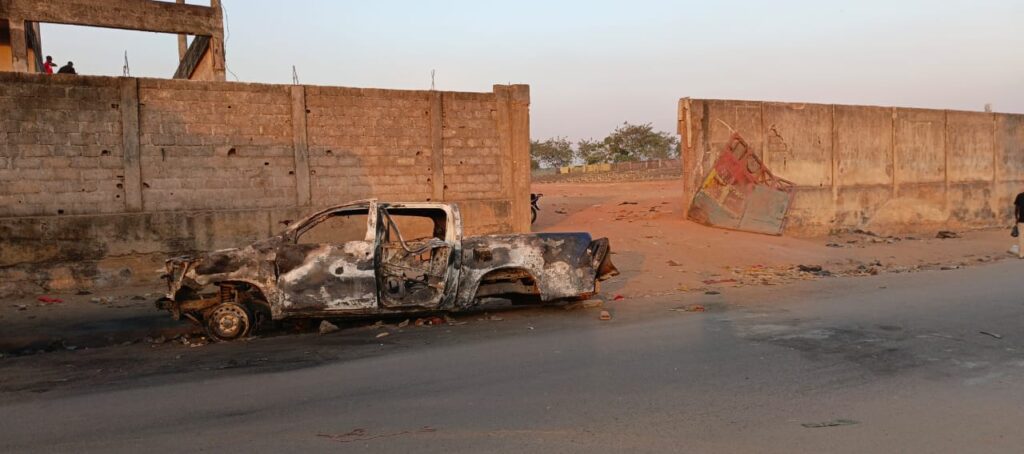Amnesty International said today that two weeks after dozens of people were killed at a football match in Nzérékore on December 1, Guinean authorities must conduct an independent and impartial investigation into the causes of death and safeguard the right to freedom of expression.
“The government’s current silence, combined with the city’s restrictions on internet access, rightly raises doubts about the authorities’ willingness to fully address this tragedy.” Samira Daoud, Amnesty International’s regional director for the West and Center Samira Daoud said: “Many organizations and witnesses interviewed by Amnesty International have denounced the official death toll following the stadium incident as inaccurate and believe the death toll could be much higher, based on reliable information.
Some 135 people died, according to human rights groups
According to a government press release, on December 1, the government reported a “provisional” death toll of 56, based on information provided by the “Hospital Service”. But on December 3, a human rights organization in the Nzerekore region put forward figures of 135 dead and about 50 missing in a written statement. People interviewed by Amnesty International in Nzérékore said that since the incident, the number of burials in several cemeteries in the town has exceeded the figures announced by the authorities. “Also, not all victims go through area hospitals,” said one person we spoke to. A member of civil society contacted by Amnesty International on 11 December said: “Currently, we maintain the figure of 135 deaths, but we know this will change. Once we complete the ongoing census, we will be able to Give accurate numbers.
Controversial refereeing decisions during the game led to incidents on the pitch and in the stands that led to police using tear gas, according to footage and testimonies analyzed by Amnesty International. As a journalist who attended the event explained to Amnesty International, the situation caused panic among the thousands of spectators.
The investigation announced by the authorities must determine whether police took all reasonable efforts to limit the risk to the crowd.
Amnesty International Regional Director for West and Central Africa Samira Daoud
“The police fired tear gas to force the crowd to leave the scene. They fired into the pitch and into the stands. The crowd was frightened and rushed towards the gates, which were the only way out”, leading to a fatal stampede. Another reporter explained that the intensity of the tear gas was increased to clear the way for the ministers inside the stadium.
“The investigation announced by the authorities must determine whether the police made all reasonable efforts to limit the risk to the crowd. In accordance with UN General Comment No. 37 on the right of peaceful assembly, tear gas should only be used as a last resort and after warning , but according to several witnesses, this was not the case during the Nzerekore incident.
Violation of the right to freedom of expression and information
A week after Nzerekore, access to the Internet was restricted, limiting the dissemination of information and videos related to the tragedy. So far, authorities have not given any explanation for the shutdown.
Since 2020, successive authorities have regularly cut off the Internet. These violations of the rights to freedom of expression and access to information have continued since the Commission for National Development (CNRD) came to power, in defiance of the ECOWAS Court of Justice’s ruling of 31 October 2023, which held that in 2020 the Internet The suspension violated the applicant’s right to information. At the time, the court ordered Guinea to “take all measures to ensure that this does not happen again in the future”.
background
The final of the “Reconstruction Championship” football match was organized “under the high leadership of General Amara Kamara, Minister and Minister” and the trophy was awarded to Mamadi Doumbuya, according to the official advertisement released by the authorities announcing the match. Awarded by Lieutenant General.
Rallies in support of the National Council for Democracy and Democracy have multiplied in Guinea in recent months, in particular to encourage support for the adoption of a new constitution, despite the ban on “all demonstrations on roads that may damage social peace and the proper implementation of the activities contained”. According to a CNRD press release of May 13, 2022, “in the timetable, (…) it is temporarily until the election period”.
On the other hand, security forces have often suppressed demonstrations by hostile governments, in violation of international law, as Amnesty International documented in its report entitled Wounded Youth: Victims of Guinea’s Unlawful Use of Force Urgently Need Care and Justice. .


